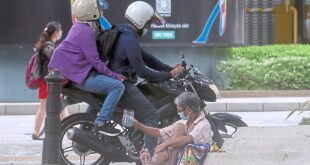Serving at Nanak Soup Kitchen, an initiative by the Sikh community in the heart of Kuala Lumpur, has been one of the most enriching and humbling experiences of my life.
Every week, we feed the homeless.
Through this simple act, I have been faced with a reality many of us overlook – the daily struggles of those who have nowhere to call home.
I’ve seen them resting on hard cardboard in narrow, unsheltered spaces along the pavements of shoplots.
Their faces light up when we arrive and they thank us profusely for the food.
For them, nothing is certain – not even their next meal.
It dawns on me how blessed I am to enjoy warm meals daily and sleep in a comfortable home.
Most of us take these basic necessities for granted.
The homeless’ struggle is relentless.
Without a permanent address, they don’t possess personal agency.
They have no control over the rain, scorching heat or constant noise from traffic.
Hygiene is an ongoing battle.
Many simply survive, taking one day at a time, with no certainty about the next.I once encountered a middle-aged homeless woman near Masjid Jamek LRT station.
She spoke fluent English, was articulate and could easily be employed as a maid, babysitter or even in a nearby restaurant.
Despite her abilities, she remains homeless.
This leaves me wondering what unseen barriers are keeping her and many like her from gaining employment and stability.
It’s easy to judge the homeless. Many people see them lying around, sleeping through the day and think they are lazy.
The reality, however, is far more complex.
Since they have no access to basic facilities like water, electricity and toilets, how can we expect them to live with the dignity that society demands?
Some struggle with addiction or appear disengaged, but we need to ask ourselves what drove them there.
Is it fair to judge someone who spends his days just trying to survive on the streets?
I’ve also noticed a shift in attitudes when giving money to the homeless. At times, if you give them RM10, they are grateful, but should you offer RM5 or even RM1, you might get a cold stare.
Such a reaction makes you wonder whether your kindness is helping or fostering a sense of entitlement.
A well-intentioned idea is to pay forward at restaurants so the homeless can have their meals there.
But would restaurant owners welcome a homeless person in tattered clothes, smelling of the streets?
Would their presence deter other customers?
These are practical questions that complicate even the best intentions.
It’s time we stop viewing the homeless through the lens of judgment and start seeing them as human beings who need help, understanding and compassion.
They live in a world most of us will never experience.
For them, surviving each day is a victory in itself.
While we can offer temporary relief, real change will only come when we address the root causes of homelessness.
DR POLA SINGH
Nanak Soup Kitchen volunteer
 BeritaKini.biz Berita Viral Terkini di Malaysia
BeritaKini.biz Berita Viral Terkini di Malaysia





